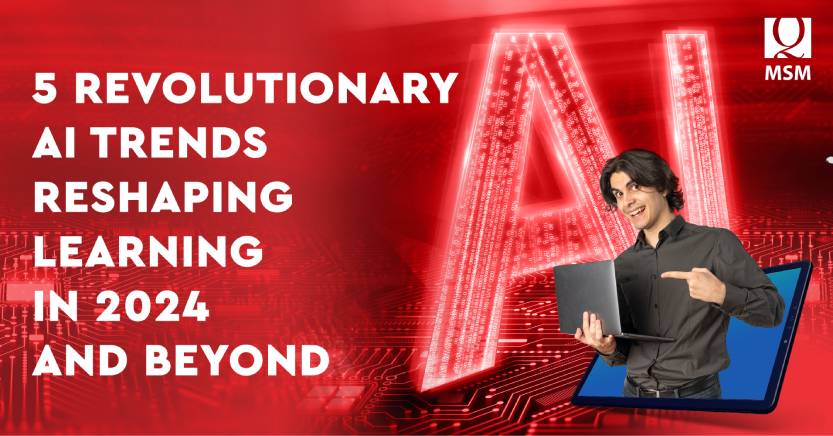More and more higher education institutions are now adopting AI technologies to stay ahead of the curve and compete in the global education market, responding to the rapid evolution of these technologies.
As we move into 2024 and beyond, AI’s role in advancing learning will continue to expand, presenting opportunities to improve curriculum delivery, customize learning experiences, and prepare students for success in an AI-driven economy.
Here are 5 AI trends that are reshaping learning, especially within higher education:

1. Holistic AI Strategy
Institutions aiming to leverage AI are expected to create holistic strategies that encompass faculty development, infrastructure improvements, and curriculum integration. This approach includes not only upgrading the technological capabilities of the institution but also ensuring that faculty members are well-equipped with the necessary knowledge and tools to incorporate AI into their teaching.
Moreover, by integrating AI into the curriculum, students are provided with a forward-thinking education that prepares them for the complexities of the future job market. By laying the groundwork for AI adoption, higher education institutions can establish themselves as leaders in technological innovation and guarantee that their graduates have the skills that future employers will need. This strategic integration of AI across all facets of the institution supports a culture of continuous learning and adaptation, essential for thriving in the rapidly evolving technological landscape.
2. Enhanced Efficiency in Teaching and Learning
AI is changing the way educators teach and students learn. AI-powered resources, such as chatbots and tutors, are moving beyond being optional additions to education. They offer individualized learning opportunities and create fresh avenues for information acquisition.
For their part, educators are utilizing AI to improve their teaching strategies. AI solutions, such as chatbots and instructional software, are enhancing traditional teaching methods with individualized instruction and engaging learning environments. For example, Character.ai provides a platform where students may have conversations with AI-generated historical people or fictional characters to enhance their learning experience.
3. Personalized Learning
Adaptive learning platforms powered by AI can completely change students’ interactions with complex material. By customizing learning pathways to individual student requirements and preferences, educators can promote deeper knowledge and expedite learning results, empowering students to reach their full potential.
These platforms utilize data analytics to continuously adjust content difficulty and presentation style, ensuring that each student is challenged at their optimal level of understanding. This personalization also fosters a more engaging and inclusive learning environment, accommodating diverse learning styles and needs. By leveraging AI to tailor the educational experience, students are not only more likely to achieve academic success but also to develop a lifelong love for learning.
4. Future-Ready Skills
Students who are exposed to AI technologies in the classroom gain valuable experience and are better equipped to succeed in an AI-driven economy. By incorporating AI into their curricula, higher education institutions can ensure that graduates are equipped with the competencies necessary to succeed in the future labor market.
This forward-looking approach enables students to develop critical thinking, problem-solving skills, and adaptability, which are essential in navigating the complexities of a technology-centric workplace. Hands-on experience with AI tools and applications also prepares students for innovative problem-solving and decision-making, qualities highly sought after in various industries.
By fostering an environment where students can interact with cutting-edge technologies, institutions play a pivotal role in shaping the leaders and innovators of tomorrow, ready to tackle global challenges with technological prowess.
5. Innovation and Adaptation
Higher education institutions can stay ahead of the curve and adjust to shifting technology trends by embracing AI. By promoting a culture of innovation and experimentation, they can continuously refine their educational programs to meet the requirements of students and stakeholders in an increasingly digital world.
Integrating AI into higher education is undoubtedly a chance to improve learning and give educators more authority, as well as better equip students for the opportunities and problems of the future. Colleges and universities can put themselves at the forefront of educational innovation and ensure they stay relevant and responsive in a world that is changing quickly by embracing AI now. The revolutionary potential of AI in higher education cannot be emphasized enough, especially as we face the challenges of the digital age. Institutions should take advantage of this opportunity to influence the direction of learning.
The implementation of AI in higher education has the potential to promote inclusion, teamwork, and data-driven decision-making. AI can remove educational obstacles and enable students from diverse backgrounds to achieve through transdisciplinary involvement and tailored learning experiences. Educational institutions can consistently modify their curriculum and augment the overall learning experience for every student by using AI to gain insights into student performance and engagement.
Lastly, higher education institutions can set the stage for a more creative, egalitarian, and successful approach to education in the future by adopting AI.
Source
- Awwad, E. (2024, January 15). Council post: Why higher education should embrace AI now to advance learning. Forbes. Retrieved from https://www.forbes.com/sites/forbesbusinesscouncil/2024/01/12/why-higher-education-should-embrace-ai-now-to-advance-learning/
- Şener, Y. (2024, January 29). Top AI trends transforming industries in 2024. Medium. Retrieved from https://ysener.medium.com/top-ai-trends-transforming-industries-in-2024-e31309eb0114




